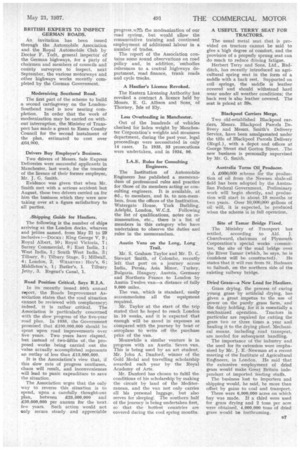A USEFUL TERRY SEAT FOR TRACTORS.
Page 41

If you've noticed an error in this article please click here to report it so we can fix it.
The usual metal seat that is provided on tractors cannot be said to give a high degree of comfort, and the provision of a properly sprung seat can do much to reduce driving fatigue.
Herbert Terry and Sons, Ltd., Redditch, has recently introduced an agricultural spring seat in the form of a saddle with a back rest. Supported on coil springs, the saddle is leather covered and should withstand hard wear under all weather conditions; the back rest is also leather covered, The seat is priced at 39s.
Blackpool Carriers Merge.
Two old-established Blackpool carriers, Messrs. Blackpool Parcels Delivery and Messrs. Smith's Delivery Service, have been amalgamated under the title of Blackpool Parcels Delivery (Regd.), with a depot and offices at George Street gnd Gorton Street. The new business is personally supervised by Mr. G. Smith.
Australia Turns Oil Producer.
A £660,000 scheme for the production of oil from the Newnes shale-oil field has been adopted by the Australian Federal Government. Preliminary work will begin shortly, and production will start in about 18 months or two years. Over 10,000,000 gallons of oil will, it is expected, be produced when the scheme is in full operation.
Site of Tamar Bridge Fixed,
The Ministry of Transport has settled, according to Ald. J. Churchward, chairman of Plymouth Corporation's special works committee, the site of the road bridge over the River Tamar (which, he says, he is confident will be constructed). He states that it will run from St. Budeaux to Saltash, on the northern side of the existing railway bridge.
Dried Grass—a New Load for Hauliers.
Grass drying, the process of curing young grass by artificial drying, has given a great impetus to the use of power on the purely grass farm, and the dairy holding, for it is essentially a mechanized operation. Tractors in particular are required for cutting the grass two or three times a year and hauling it to the drying plant. Mechanical means, including road transport, are needed fos subsequent handling.
The importance of the industry and the need for its extension were emphasized by Mr. J. E. -Newman at a recent meeting of the Institute of Agricultural Engineers, in London. He said that the extensive employment of dried grass would make Great Britain independent of imported feeding stuffs.
The business lost to importers and shipping would, he said, be more than offset by gains to coal and transport.
There were 6,000,000 acres on which hay was made. If a third were used for grass drying and 2 tons per acre were obtained, 4,000,000 tons of dried grass would be forthcoming.




































































































